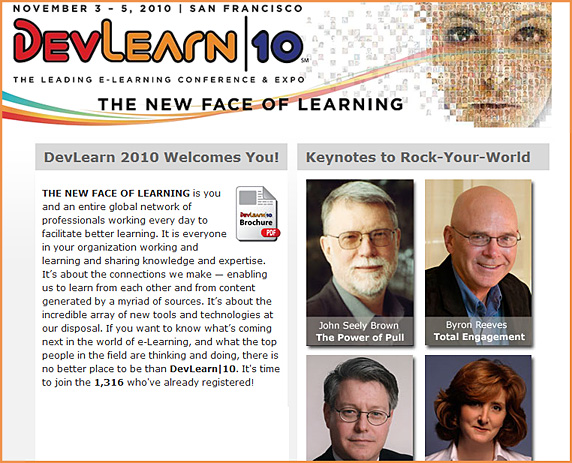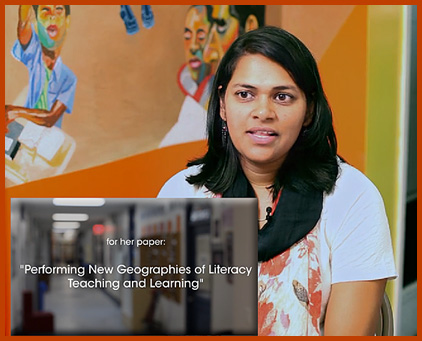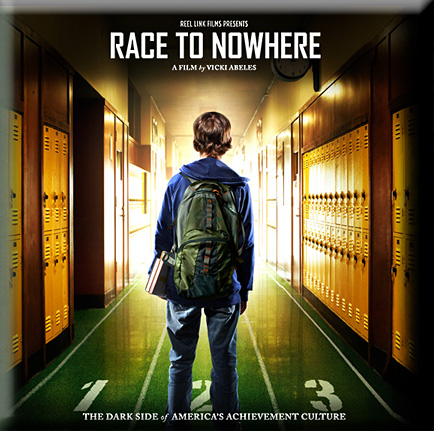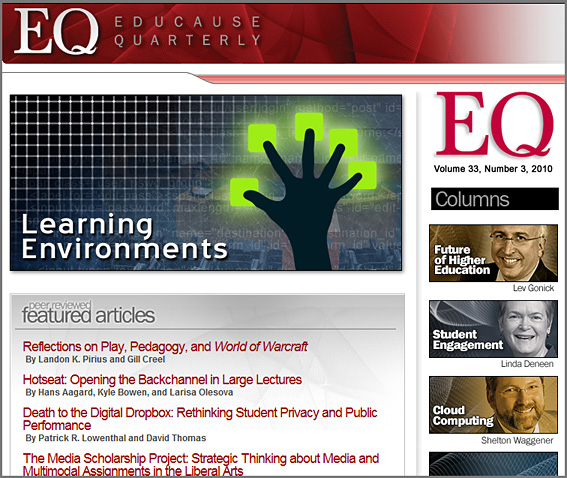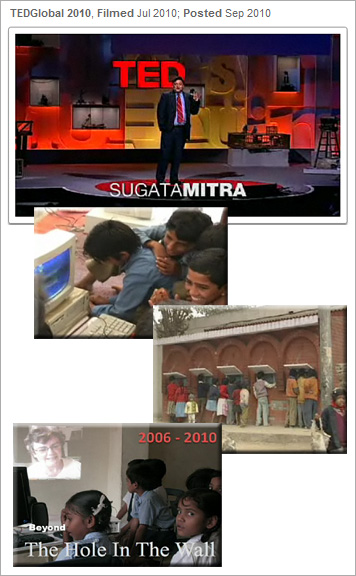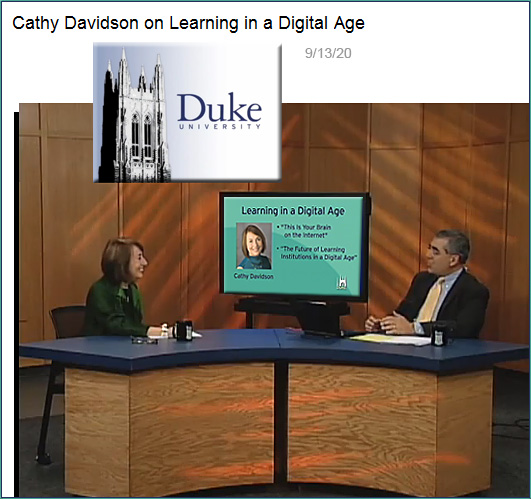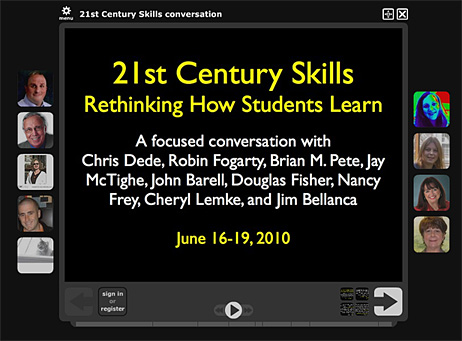How to make any 3rd grader love math — from mobile learning blog by Michael Cyger
From DSC:
First of all, I got this item from:
One Facet of the Future of Educational Publishing — by Jeff Frank
I really enjoyed watching the Strage Prize video, and it led me to think more about the relationship between online video and the publication of educational research. In my role as Managing Editor of the Teachers College Record, I read a very large number of qualitative and ethnographic studies. While the best of these papers give the reader a strong sense of the subjects and the study location (and the author/researcher), after watching the 2010 Strage Prize video, I was fascinating by how much this video added to my understanding and appreciation of Lalitha’s paper.
…
I think having the two together–the written work and the video/podcast–adds something of unique value. I hope more educational researchers and publishers experiment with these kinds of paired works, because I think they offer readers a wonderful educative experience.
Side note from DSC:
Think interactive, multimedia on an iPad sort of device.
.
Which led me to:
Strage Prize 2010 — by Gary Natriello | October 8, 2010
This video features the work of Lalitha Vasudevan and her paper, “Performing New Geographies of Literacy Teaching and Learning.” The paper focuses on the literacies and digitally mediated lives of youth, and was published in the July 2009 issue of English Education.
The video’s production and publication is supported by the Strage Junior Faculty Prize. The Prize was established in 2009 by Teachers College alumna Alberta Strage and her husband Henry to recognize junior faculty achievement. Alberta also serves on both the President’s Advisory Council and the International Advisory Council for Teachers College. We appreciate both their generosity to Teachers College and support for the work of our junior faculty.
The Prize supports the production of a web video to highlight original and innovative work of a junior faculty member at Teachers College. All currently untenured members of the faculty in tenure-line appointments are eligible to compete for the prize by submitting an article, book chapter, paper, or other original product appearing during the previous year.
Congratulations Professor Vasudevan!
The test has been canceled — from Boston.com by Keith O’Brien
Final exams are quietly vanishing from college
The change, which was first reported in Harvard Magazine, is not a statement on the value of final exams one way or the other, Harris said. But the shrinking role of big, blockbuster tests at Harvard and colleges elsewhere is raising serious pedagogical questions about 21st century education: How best do students learn? And what’s the best way to assess that? Is the disappearance of high-stakes, high-pressure final exams a sign that universities are failing to challenge today’s students, or is it just a long overdue acknowledgment that such tests aren’t always the best indicator of actual knowledge?
From DSC:
Perhaps like many others, I don’t remember a lot from the final exams taken during my college days. My hope is that whatever methods we use, we can foster deeper, longer-lasting ROI’s from students’ studying time. We can create more “hooks” on which to hang things 5-10 years down the line (if that’s possible these days!). One thought along these lines, is to use the ideas of story, play, and promoting the creativity of our students.
The greatest teacher of all time used story — in the form of parables — all the time. I’ll bet that many of us can still recall to this day the parable of the sower, or the prodigal son…the good Samaritan or the lost coin. With enough repetition, we remember these stories and the deeper meaning behind them. They provide hooks to hang other things upon (i.e. scaffolding).
From DSC:
The other day, I was lamenting that the love of learning gets lost waaayyy too quickly in our youth. With drop out rates in the 25-30% range nationwide, we must turn this around.
A piece of that turn-around picture involves the opportunity for students to collaboratively create things (in a cross-disciplinary sort of way). This is why I am a big fan of multimedia-based projects:
- One student can write the script.
- Another can do the filming.
- Another can take pictures for still shots.
- Another can do the film and/or image editing.
- Others the acting or singing or playing music.
- Others can create the artwork or use their knowledge to create props
- Etc.
But I’m getting ahead of myself. The film below discusses the dark side of our culture as it involves schools and education. But the topic is not just related to schools, but to our society in general. That is, we’ve been sold a bill of goods. We believe that you must earn a lot of money to be successful and happy…and that whomever dies w/ the most toys wins.
This competitive streak is a worldly way of looking at things…but is a powerful current to fight. In fact, coming from a competitive background and being a Christian (in faith) myself, I’ve often asked myself whether I believe competition is a good thing or a bad thing. I don’t think I’ve arrived at the final answer to that question, as sometimes I think it can be good (as it can be helpful in developing characteristics of discipline, perseverance, character, integrity, etc.) and sometimes it can be bad. Check out the video/trainer here to see what I mean.
The Moodle Philosophy — from synergy-learning.com by Joel Kerr (emphasis below from DSC)
It is often said that Moodle is designed with pedagogy in mind. The developers are very transparent about the philosophy they use when making decisions about the direction of Moodle, a philosophy that focuses on what is best for the learner.
The design and development of Moodle is guided by a “Social Constructionist Pedagogy”, which can be explained in terms of four main related concepts: constructivism, constructionism, social constructivism, and connected and separate.
Learning TRENDS by Elliott Masie – Sept 22, 2010.
#637 – Updates on Learning, Business & Technology.
55,132 Readers – http://www.masie.com – The MASIE Center.
Host: Learning 2010 – Oct 24 to 27, Orlando, FL, USA.
1. Flip Happens – Reversing Process for Teaching? My colleague, Dan Pink has written about the concept of “Flip Thinking” In a recent article, Dan talks about experiments in reversing the “natural” sequence of things. For example, what if a teacher were to give the lectures as homework and the activities shift to the classroom. The author of the now viral “Shift Happens” slideshow has been doing that for high school algebra – he provides videos of the lectures for the students to view before class and uses in class time for questions, discussions and practice. There is great promise for flipping processes in learning and education. Check out Dan’s article:
Think Tank: Flip-thinking – the new buzz word sweeping the US
Teacher Karl Fisch has flipped teaching on its head – he uploads his lectures to YouTube for his students to watch at home at night, then gets them to apply the concepts in class by day.
From DSC:
I saw this same innovative thinking/approach a while back with some high school chemistry teachers implementing this “flip” in their classrooms…check out:
The Vod Couple — from The Journal by Dian Schaffhauser — back from 08/01/09
High school chemistry teachers Aaron Sams and Jonathan Bergmann have overturned conventional classroom instruction by using video podcasts to form the root of a new learning model.
Sams (left) and Bergmann
together practice a student-centered pedagogy.
Watch out for the digital trees — from odysseyware.com
For the first time ever, iNACOL (International Association for K-12 Online Learning) teamed up with the SREB (Southern Regional Education Board) to honor an “outstanding online teacher for exceptional contributions to online K-12 education as the nation’s K-12 Online Teacher of the Year.”
Teresa Dove, a Virginia math teacher, was chosen from more than 50 nominations of online educators in public schools and state virtual schools nationwide.
Dove said after receiving the award that teaching online allows her to spend much more time working individually with students than she did previously in a traditional classroom. Spending only a moment with students in a traditional classroom is “not enough, and our kids deserve better,” she said.
What struck me most about this award, was the advice Dove offered to online teachers as reported in an article from eClassroom News. When asked about her success, she didn’t talk about technology or the way to deliver information in an online format. She didn’t talk about how to create lessons that “translate” in the digital format.
She offered five lessons – practices – that make her effective. All of them were about relationships.
Music and learning: do they mix? — Clive Sheperd (UK)
From DSC:
Check out the comments as well…
For me, digital storytelling carries with it some potent power to educate, influence, and persuade. At minimum, music seems like it has a solid place in the digital storytelling world. However, I also realize that extraneous audio can be distracting, especially for those of us who need it quiet when we are trying to concentrate. Giving the user the choice of whether to listen/hear the audio — or see a transcript — are useful features that help provide a more customized learning experience.









